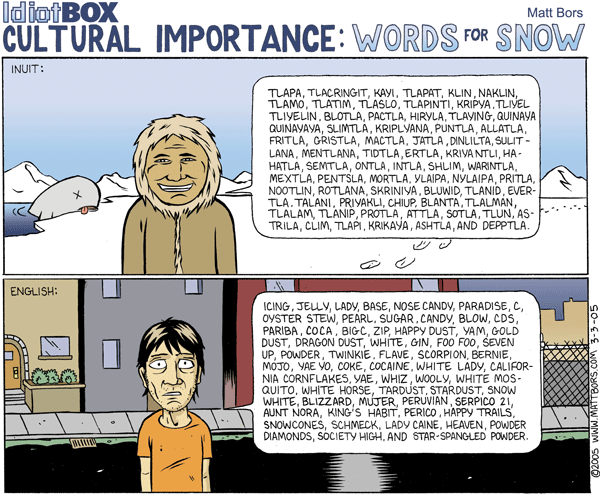October 05, 2005
The cultural importance of jokes
Geoff Pullum has put it plainly , and even in bold face: YOU CANNOT draw conclusions about what a culture values, or what speakers perceive, or how a nation thinks, by selective comparison of the senses of a few lexical items. This is especially true if the lexical items are invented as a joke by someone who doesn't know the language under discussion. A case in point, via Benjamin Zimmer:
I wonder how many readers of Matt Bors' strip will recognize (as Ben Zimmer did) that the "Inuit" list in the top panel is taken from a satire due to Phil James, "The Eskimos' Hundred Words for Snow", which has been circulating on the internet since 1996 or so, and includes obviously fake (though funny) items like
tliyel snow that has been marked by wolves
tliyelin snow that has been marked by Eskimos
hiryla snow in beards
tlayinq snow mixed with mud
quinaya snow mixed with Husky shit
quinyaya snow mixed with the shit of a lead dog
puntla a mouthful of snow because you fibbed
allatla baked snow
fritla fried snow
gristla deep fried snow
MacTla snow burgers
jatla snow between your fingers or toes, or in groin-folds
ertla snow used by Eskimo teenagers for exquisite erotic rituals
hahatla small packages of snow given as gag gifts
warintla snow used to make Eskimo daiquiris
mextla snow used to make Eskimo Margaritas
mortla snow mounded on dead bodies
ylaipi tomorrow's snow
nylaipin the snows of yesteryear ("neiges d'antan")
ever-tla a spirit made from mashed fermented snow, popular among Eskimo men
huantla special snow rolled into "snow reefers" and smoked by wild Eskimo youth
tla-na-na snow mixed with the sound of old rock and roll from a portable radio
depptla a small snowball, preserved in Lucite, that had been handled by Johnny Depp
I'm happy to agree that you can draw conclusions about what a culture values, or how a nation thinks, by looking at its myths. But what does the Eskimo-Snow-Words myth tell us about our own culture? I guess we can learn that a good story will always outrun the fact checkers -- but this is hardly unique to us. The snow-words myth underlines our love of exoticizing otherness, but there's a specificity to the ingrained idea of words as a window on the mind of the Other that remains puzzling.
Posted by Mark Liberman at October 5, 2005 07:29 AM